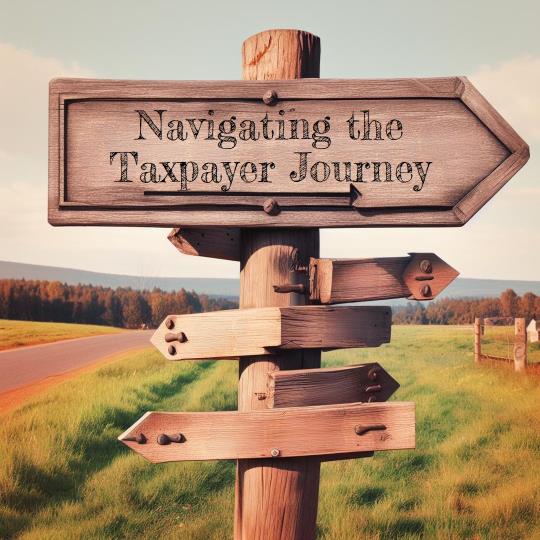Table of Contents

Self-employment comes with its own set of tax responsibilities, from understanding deductions and credits to filing returns correctly. Here are some frequently asked questions (FAQs) and personal taxpayers journey maps to help you navigate the tax landscape as a self-employed individual.
FAQs for Self-Employed Individuals
Q: What is self-employment tax?
A: Self-employment tax is a combination of Social Security and Medicare taxes that self-employed individuals pay. It is similar to the FICA (Federal Insurance Contributions Act) taxes that employees pay, but self-employed individuals must pay both the employer and employee portions.
Q: What are the different types of business structures for self-employed individuals?
A: There are several business structures available to self-employed individuals, each with its own tax implications. Some common options include:
- Sole proprietorship: The simplest structure, but you are personally liable for business debts and obligations.
- Partnership: A business owned by two or more people, who share profits and losses.
- S corporation: A corporation that elects to pass corporate income, losses, deductions, and credits through to its shareholders for federal tax purposes.
- Limited liability company (LLC): A business structure that offers limited liability protection for its owners.
Q: What are the most common deductions for self-employed individuals?
A: Self-employed individuals can deduct many expenses related to their business, including:
- Office space
- Equipment and supplies
- Travel and transportation
- Marketing and advertising expenses
- Professional fees
Q: When do I need to file a tax return as a self-employed individual?
A: Self-employed individuals are generally required to file a tax return every year, even if they do not owe any taxes. The deadline for filing is usually April 15th, though there are some exceptions.
Q: What are the penalties for not filing a tax return as a self-employed individual?
A: The penalties for not filing a tax return can be significant. These can include late filing fees, interest, and even criminal penalties in some cases.
Personal Taxpayers Journey Maps
The IRS has developed personal taxpayers journey maps to guide individuals through the different stages of their tax journey. These maps provide information on topics such as:
- Filing a tax return for the first time
- Understanding tax forms and schedules
- Claiming deductions and credits
- Dealing with tax audits
- Preparing for retirement
These maps can be a valuable resource for self-employed individuals as they navigate the complexities of taxes. They can be found on the IRS website at https://www.taxpayeradvocate.irs.gov/get-help/roadmap/.
Additional Resources
In addition to the IRS information, there are many other resources available to help self-employed individuals with their taxes. These include:
- Tax software: There are many tax software programs available that can help you prepare your tax return. These programs can be especially helpful for self-employed individuals who have a lot of deductions and credits to claim.
- Tax professionals: If you need more help, you can consult with a tax professional. Tax professionals can help you prepare your tax return, file it with the IRS, and resolve any tax issues.
Taking the time to learn about your tax obligations as a self-employed individual can help you avoid penalties and maximize your tax savings. By using the resources available to you, you can ensure that you are compliant with tax laws and make informed decisions about your financial future.

Starting a Business
| Stage | Activities | Touch-points | Customer Sentiment |
|---|---|---|---|
| Awareness | Identify business idea, research business requirements | Online resources, books, workshops | Excitement, apprehension |
| Consideration | Develop business plan, research funding options | Online business plan templates, investor websites, pitch competitions | Determination, anxiety about funding |
| Decision | Register business, obtain licenses and permits | Government websites, business registration forms, permits offices | Relief, sense of accomplishment |
| Action | Navigate business startup tasks, establish operations | Business software, accounting tools, marketing materials | Confidence, focus on growth |
| Retention | Build customer base, manage finances, expand business | Customer interactions, online marketing, business expansion plans | Optimism, anticipation for future success |
Filing a Tax Return

| Stage | Activities | Touch-points | Customer Sentiment |
|---|---|---|---|
| Awareness | Research tax filing requirements | IRS website, tax software advertisements, social media | Uncertainty, confusion |
| Consideration | Compare tax software options, gather documents | Tax software websites, reviews, online forums | Anticipation, some anxiety |
| Decision | Select and purchase tax software, download and install | Tax software websites, purchase confirmation emails, installation instructions | Confidence, relief |
| Action | Create tax return, file electronically | Tax software interface, online filing system | Satisfaction, sense of accomplishment |
| Retention | Receive tax refund or notification of balance due | IRS website, bank account deposit notification | Optimism, or disappointment |
Self-employed & Business tips
Join Us @ WhatsApp – Business and Tax Bulletin: https://chat.whatsapp.com/KnL4LlTaliy3JFWoj63GHd
Q&A chat https://wa.me/14052521090
